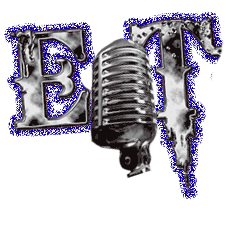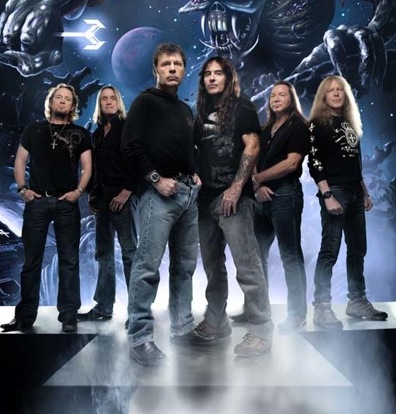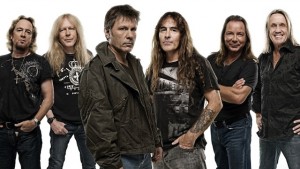Members of Iron Maiden discuss their albums with Classic Rock Magazine. Read what they had to say below.
Iron Maiden (1980):
Steve Harris: “It’s all there – powerful songs, loads of attitude, and as a singer, Paul (Di’Anno) had real charisma. But, everyone knows that I wasn’t happy with the production. It album didn’t have enough of the fire and the anger that we had in our playing. We used to laugh about the producer (Will Malone) sitting there with his feet up on the desk, smoking a big cigar and reading Country Life – because he didn’t do f–k all else. So in the end we would just ignore him. It was still a good album, it just didn’t sound as ferocious as we did when we played live.”
Killers (1981):
Dave Murray: “On the first album we were playing fast, almost like punk rock, but with more melody. Martin’s production on Killers gave us a little more polish, without losing our edge. The title track on that album is still one of my favorites. It has such a pure and raw energy, and we carried on playing it live for years. Of course, this was the last album we made with Paul. When Bruce came in, that was an even bigger turning point for the band. But I think Paul sounded great on Killers. The whole album is really powerful and atmospheric. And really, it was Martin Birch who brought that out of us.”
The Number Of The Beast (1982):
Bruce Dickinson: “I knew that I had joined a great band. I also knew I could make it even better. I had a vision for The Number Of The Beast, my voice glued on to Maiden equals something much bigger. We did it fast – four or five weeks. We’d be in the studio till five or six in the morning. The one mistake we made was putting Gangland on the album instead of Total Eclipse. We picked Gangland because it was the first thing we ever recorded together properly. But the rest of the album was fantastic. Hallowed Be Thy Name was a precursor to Rime Of The Ancient Mariner. That song, and the whole album, took Maiden to a different level.
Piece Of Mind (1983):
Nicko McBrain: “It was my first record with Maiden, so it’s very special to me. The first time I ever saw them play live was in 1979, and I knew they had it. Clive (Burr) was such a great drummer. I certainly wasn’t out for his job, but I did think to myself, I could be in that band. And in the end, it was meant to be, I suppose. For me, making Piece Of Mind was one big adventure. We were recording in the Caribbean, and I’d never been there before. And of course we had all these epic tracks – The Trooper, Revelation, Flight Of Icarus, and best of all for me, Where Eagles Dare. The intro in that track – that drum riff – is right up there with the likes of Phil Collins and Neil Peart. It’s still one of my favorite Maiden songs.”
Powerslave (1984):
Adrian Smith: “We recorded the album at Compass Point studios in Nassau. And in those days, some of us were rather easily distracted. One night I was with Martin Birch, partying till three in the morning. The next day I turned up the studio, really hungover, and there’s Martin, still up from the night before, and beside him is Robert Palmer, who lived next door to the studio. I had to do my solo for the track Powerslave, and I had the shakes, but I just went, f–k it. I pulled off a solo and Robert Palmer was going, ‘That’s f–king great!’.”
Live After Death (1985):
Bruce Dickinson: “It was a real statement, a live double, like the ones we all loved when we were growing up. My favorite live album is Deep Purple’s Made In Japan. But I recall reading Ian Gillan saying, ‘I thought it was a piece of s–t, I sounded crap on it.’ And I was like, ‘No, no, no – you’re wrong!’ The funny thing is, I’m the same with Live After Death. When Maiden fans tell me it’s our best live album, I’m like, ‘Oh, I don’t know about that.’ But just recently I listened to Live After Death and it sounded pretty good. And “Scream for me, Long Beach!” has become a part of Maiden folklore.
Somewhere In Time (1986):
Adrian Smith: “We went for a new kind of sound on Somewhere In Time, using guitar synths, and two of my songs for that album came out really well, Stranger In A Strange Land and Wasted Years. When we were mixing in New York, I was in my hotel room listening to the tracks with Martin Birch, and there was a knock at the door. I opened it and Tom Jones was standing there. He said: ‘I heard the music, lads. Do you mind if I come in?’ He listened to the album, and as we talked I realized that what we do is pretty much the same: making records, doing shows. Except that with Maiden, it’s a bit louder.”
Seventh Son Of A Seventh Son (1988):
Steve Harris: “It was a new challenge for us, making a concept album. I’ve always loved prog – Yes, Genesis, ELP – and this album’s title track was a powerful song with that prog element to it. Not everyone liked the album at the time. Bruce even said to me that Queensryche had made a better concept album that ours, with Operation: Mindcrime. I said, ‘That’s a really good album, but ours is a f–king great album!’ Not long after that, Bruce did a solo album. He was struggling within himself. We didn’t realize how much until later.”
No Prayer For The Dying (1990):
Janick Gers: “I’d done Bruce’s solo album and tour, and we hadn’t played any Maiden songs live, but then Bruce asked me to learn four Maiden songs and go down to Steve’s place. That was when they told me that Adrian had left. The first song we jammed on was The Trooper, and it sounded so tight, so powerful, they just said, ‘You’re in.’ I said to myself, ‘I’ll last two weeks here. Once they get to know me they won’t like me!’ But it was fantastic. The tour was a back-to-basics show, which was cool. Some people missed the plastic pyramids, but I can take them or leave them!”
Fear Of The Dark (1992):
Dave Murray: “It was a very different album for Maiden. A lot of the music was more a classical kind of rock, with lots of time changes. I can still remember the moment when we recorded the song Fear Of The Dark. We knew right away that it was going to be a standout live track. Everything about it – the power, the melodies, the lyrics, the pacing of the song and the way it changes – it really sums up what Maiden is all about. The way the fans sing it when we’re playing live, it really has become an anthem for us.”
The X-Factor (1995):
Janick Gers: “When Bruce quit, I couldn’t believe it. It felt like we’d been left high and dry, and we had to decide what to do: do we stop, or carry on? We listened to so many tapes of singers. But with Blaze, we just felt that he had the right attitude and that he had a really raucous voice. As soon as we got him rehearsing with the band, it felt good, and right from the start we wrote some great stuff. Sign Of The Cross was such a powerful song, really dark and atmospheric. And I thought Blaze really came into his own with Man On The Edge. It was important to show people that we could do it without Bruce.”
Virtual XI (1998):
Nicko McBrain: “Blaze did a great job on Virtual XI. Steve wrote some really great stuff for Virtual XI – tracks like Futureal, The Clansman, The Angel And The Gambler. It’s an album we’re all very proud of. But as it turned out, it was the last one with Blaze. We knew Bruce wanted to come back, and obviously there was a question mark, would it happen again? He’s s–t on us once… There was that hurdle to get over, but once we did that, by talking to each other, it was like a new band.”
Brave New World (2000):
Adrian Smith: “For Bruce and myself, it felt like coming home. Maybe in the outside world, this album was viewed as a comeback, but not for the other fellas that had been in the band for all that time while we were away. The 90s might have been a bit of a low point for Maiden because of the emergence of Nirvana and the whole grunge thing, but Maiden were still out there with Blaze, playing in massive arenas in South America. So if some people want to call Brave New World a comeback, that’s okay, but I think a better word is ‘revitalization’.”
Dance Of Death (2003):
Janick Gers: “I loved the feel of this album. Everything about it felt big. And the song Dance Of Death is one that I’m really proud of. It was based on the Ingmar Bergman movie, The Seventh Seal. I saw it when I was a kid and just loved it. It’s about someone looking for hope in a world that’s devastated. And at the end of the movie there is this dance of death. The funny thing is, I was on the tube not long after we’d written it, and I saw this huge poster of The Seventh Seal. Such a weird coincidence.”
A Matter Of Life And Death (2006):
Bruce Dickinson: “There’s a lot of great stuff on this album. A lot of strange time signatures. It was a very brave move for us on that tour – to play the album from end to end: ‘We’re going to play the whole f–king album for the people who are about the here and now, the people who are interested in the band going forward.’ You’ve got to keep on making new music, and great new music, because without it you’re just the world’s biggest karaoke band.”
The Final Frontier (2010):
Steve Harris: “Bruce had a bit of fun with that title, joking as if it was our last album. We all knew it wasn’t, that we’d do at least one more. Really, that title was just my science fiction thing coming into play. I’m fascinated by all the conspiracy theories about alien life. I’m not so sure I believe that stuff, but I wouldn’t rule it out. That’s a pub debate right there. But that title gave us a great concept for the artwork. And there’s certainly quite a proggy feel to a few of the longer tracks on the album.”
The Book Of Souls (2015):
Steve Harris: “We knew that this, more than any other album, was going to be a long one. We don’t seem to write short songs any more. I don’t know why. The title track is a big song. And then Bruce brought in Empire Of The Clouds. It was only when we started recording it that we realized, Christ, this is ridiculously long! To me, it’s almost like a West End play. I’ve told Bruce that I think it’s a masterpiece. He might have thought I was winding him up, but I wish I’d written it, and I can’t give someone a better compliment.”
What is your favorite Iron Maiden album and what your thoughts about what they had to say about their records?
source: teamrock.com



28 Responses
Pyromania has the technology overpowering the substance of the music, even great songs like those, and is a blatant example of choosing money over aesthetics. The Scorps, on the other hand, wrote some very commercial songs, but didn’t compromise the nature of who they were.
Will all due respect, as with all opinions, I humbly disagree with your comment about Pyromania.
Other than Priest’s Screaming for Vengeance, that is probably my next favorite album of all time. While I love High N’ Dry as well, to me, Pyromania had slightly better songs.
The fact that Mutt Lange made five voices sound like five thousand back in 1983, was no only visionary, but unique. I also feel that even if you took the technology out of the album, and stripped those songs down, they would still be great. Again, to each their own.
D 🙂
Well, I did say the songs were great, very meticulously arranged, but Mutt pushed the guys to make a “blockbuster”, and there’s something too self conscious about the proceedings here. He over-did the production, those voices you mention, you start wondering if they’re human as the record goes on. In other words, the damn production wears down the listener, and becomes counter-productive.
Again, I’m a vinyl guy, and the record is what brought me to this conclusion. He designed it to sound great on a crappy system, so as to make more money, but, the drawback is that if you put the record on a good system, it sounds naked, that is, you hear how bionic it is.
He’s like Ezrin, he likes to throw in unnecessary “atmosphere” at times, like I don’t get that hip hop thing he threw on the end of the record.
Compare/contrast with Love At First Sting, which has that same crossover quality, but still retains its organic quality,
I disagree, as I feel your comments apply strongly to Hysteria, as opposed to Pyromania.
As for the album being overproduced, I have heard it run through a studio soundboard, with isolated tracks. I did not think it sounded bionic, but rather symphonic.
Regarding your “hip hop” comment, while I never cared for the ending of Pyromania either, I would never call it “hip hop.” “Electronica,” maybe?
The sole purpose was so the needle of the record player would keep skipping back and playing the music until you physically removed the needle yourself. Unlike most records, when the needle entered the groove pool (as I call it), it would automatically shut itself off. It was just an audio trick to make the record a bit more unique. Could the music have been better? Perhaps, but if that is one of the few missteps this album makes, no biggie. It is at the end, anyway.
D 🙂
The music is great, flawless even, it’s the treatment the songs got that is so problematic, and like I said, my assessment is from the vinyl on my turntable.
You heard it on a soundboard, I haven’t heard it like that, but, the CD didn’t bother me one bit, nor when I hear it on a crappy little radio, it was only when I got the analog pressing that its mechanical became apparent and overpowered those great songs. (Funny, Love At First Sting is a digital recording, and it sounds very natural).
What bothers me is that Mutt’s motivation was to sell more records, i.e., the production seems to be merely a means to an end.
“Hip Hop thing” is what I said, that was intended as a very loose, subjective interpretation, but neither of us care for it, right?
But, thanks for enlightening me on its purpose, I did not know that.
No worries. It used to drive me crazy because I always had to run to turntable to pull the lever to lift up the neddle.
And the end, the last thing you hear from your experience with a record, is actually very important.
: )
Not necessarily…
…Pyromania has the same problem that the Eagles had, or I should say Henley and Frey, it’s so preoccupied with making hits that it loses the perception of spontaneity.
UH-OH, the clown is back! …99 bottle of beer on the wall… 😉 LOL!!!
My comment went the way of Dennis Stratton, so I’ll repost.
In 16 albums, I really don’t think there are any true duds (ie. St. Anger, Van Halen 3, etc).
Granted, the albums in the 1990s aren’t as consistent as the 1980s albums, or the more prog influenced 2000s albums, but there’s still some classics on each and every one.
Blaze Bayley might not have been the best fit, but with a little trimming, X Factor, could have been a classic.
Piece of Mind has that off the wall quality that was Maiden, but that sure got formulaic, and quick.